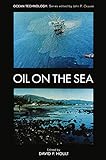Oil on the sea: proceedings of a symposium on the scientific and engineering aspects of oil pollution of the sea [Libro electrónico] / Edited by David P. Hoult
Hoult, David P [editor].
Tipo de material: Libro
en línea Series Editor: New York, New York, United States: Plenum Press, c1969Descripción: vii, 114 páginas : ilustraciones ; 24 centímetros.ISBN: 9781468490213 (Print); 9781468490190 (Online).Tema(s): Oil pollution of the sea -- CongressesNota de acceso: Disponible para usuarios de ECOSUR con su clave de acceso Nota de bibliografía: Incluye bibliografía e índice: páginas 113-114 Número de sistema: 55535Contenidos:Mostrar
Resumen:
Libro
en línea Series Editor: New York, New York, United States: Plenum Press, c1969Descripción: vii, 114 páginas : ilustraciones ; 24 centímetros.ISBN: 9781468490213 (Print); 9781468490190 (Online).Tema(s): Oil pollution of the sea -- CongressesNota de acceso: Disponible para usuarios de ECOSUR con su clave de acceso Nota de bibliografía: Incluye bibliografía e índice: páginas 113-114 Número de sistema: 55535Contenidos:Mostrar
Resumen:| Tipo de ítem | Biblioteca actual | Colección | Signatura | Estado | Fecha de vencimiento | Código de barras |
|---|---|---|---|---|---|---|
| Libros | Biblioteca Electrónica Recursos en línea (RE) | Acervo General | Recurso digital | ECO400555353285 |
Incluye bibliografía e índice: páginas 113-114
1. Effects of 'torrey canyon' pollution on marine life.. 2. Oil pollution of the ocean.. 3. The Santa Barbara oil spill.. 4. The role of chemical dispersants in oil cleanup.. 5. The spread of oil slicks on a calm sea.. 6. Containment and collection devices for oil slicks.. 7. Removal of floating oil slicks by the controlled combustion technique.. 8. Oil transportation by sea.. 9. The role of the federal government in controlling oil pollution at sea.. Index
Disponible para usuarios de ECOSUR con su clave de acceso
In the last decade, changes in the scale of operations required to find and transport oil have led to a pollution problem of major proportions: oil on the sea. These changes occurred slowly, and the change in magnitude of the possi bilities for . pollution went unrecognized until a series of dramatic accidents recently gave the problem wide-spread public notice. The Torrey Canyon and Santa Barbara episodes are discussed in this volume. The changes in the scale of oil operations stem from an ever increasing demand for energy. In response to this demand, oil drilling from offshore rigs on the continental shelf has been rapidly developed. To inexpensively trans port oil to the consumers of energy, huge supertankers, of ever increasing size, are being constructed. These ships effect economic savings at the expense of being relatively underpowered, and less maneuverable. Having very deep draft, they are constrained to operate on the high seas and the few deep harbors of the world. Every year there is more oil pumped from the sea floor. Every year more oil is trans ported over the sea. Approximately one tenth of one per cent of this oil each year is spilled on the sea. The purpose of the present volume is to provide a summary of our current understanding of the problem of oil on the sea. Before describing in detail the topics presented, it seems well to point out. eng
Disponible en línea
Disponible en formato PDF
Subscripción a ELSEVIER 26 de diciembre del 2013
